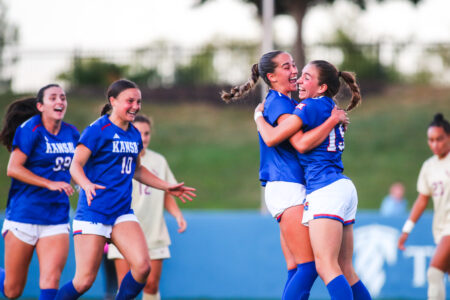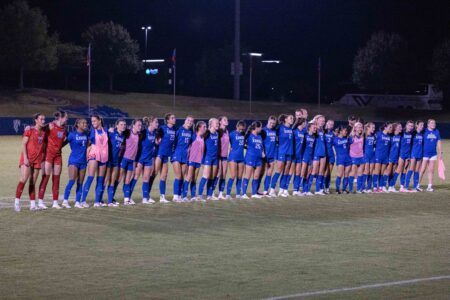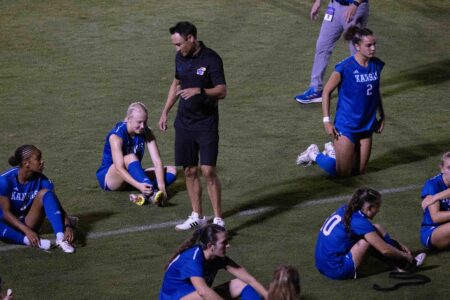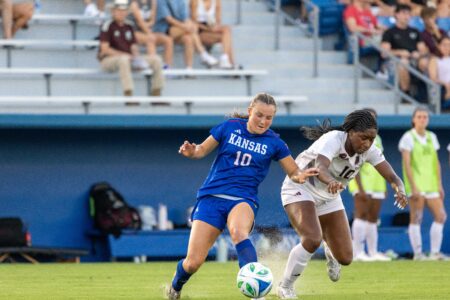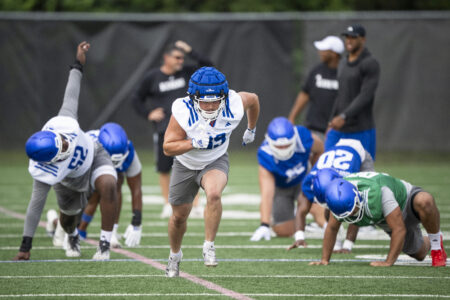In seeking advice from top programs on its searches, KU often finds new head coaches
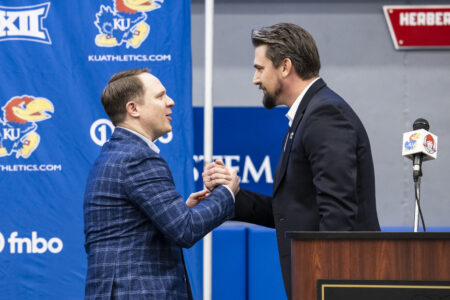
photo by: Kansas Athletics
New KU volleyball coach Matt Ulmer, right, shakes hands with athletic director Travis Goff at Ulmer's introductory press conference on Tuesday, Jan. 21, 2025, at Horejsi Family Volleyball Arena.
The Kansas athletic department is asking sincerely when it calls the nation’s top programs for advice on its coaching searches, athletic director Travis Goff says.
It just turns out that some of those programs’ head coaches become interested in KU themselves.
Excluding football coach Lance Leipold and baseball coach Dan Fitzgerald (who was an assistant), each of Goff’s four additional hires since he took over in April 2021 — all of whom were sitting head coaches at other schools — have connected with KU as part of that sort of process, Goff said on Monday.
“I’d say the rest of them started with that approach,” he said, “and maybe even for many of them, if not all of them, on their end just going, ‘Let me lend an ear and maybe I’ve got some names to recommend,’ and then again, in each of those cases for those sitting head coaches, before you know it, they’re interested in learning more about it.”
The group Goff is referencing, of head coaches whom KU ended up hiring from other schools, includes Lindsay Kuhle (women’s golf), Nate Lie (soccer), Matt Ulmer (volleyball) and now Andrew Derrick (rowing).

photo by: Kansas Athletics
Kansas women’s golf coach Lindsay Kuhle

photo by: Mike Gunnoe/Special to the Journal-World
Kansas head coach Nate Lie celebrates with the fans after defeating TCU during the Big 12 Tournament final at CPKC Stadium Saturday, Nov. 9, 2024 in Kansas City, Mo.
Kuhle moved to KU from Denver in July 2021, while Lie came to KU from Xavier in December 2023. Ulmer’s move from Oregon to KU made waves in the volleyball world in January, while Derrick most recently joined KU from Gonzaga in late June and was officially introduced on Monday.
KU came to Derrick looking for input as it was looking to “figure out what the future should be, and figure out what they were targeting,” Derrick said.
At the time, he was not looking to go elsewhere.
“It was somewhat mind-blowing,” he said on Monday, “as far as just being in a consulting role as to what KU should be looking for, to really taking notice of the dedication that is going into not only the search but the future of the program, and I became very interested very quickly.”
He added later, in his introductory speech to KU Athletics personnel, which KU uploaded online: “It snuck up on us and it was rather fast, but that’s not to say that it wasn’t great at the same time. Karin (Derrick’s wife) and I sometimes take a little nudge to get off the couch and get moving, and Travis was very good at that. So we appreciate the nudge.”
Goff said high-level candidates have tended to become intrigued during his time as athletic director when KU has gotten “a chance to not sell but just honestly reflect where we’re trying to go in the program.”
“Some of those head coaches, those reputable, experienced head coaches on the other line, start to go, ‘You know what, maybe I might want to learn a little bit more,'” Goff said.
Derrick fit the bill, as a three-time winner of his conference’s coach of the year award who had earned four league titles in his five years at Gonzaga.
“His is another one of those examples, where initially, probably, when he answers that phone, (he) isn’t necessarily thinking that that makes maybe the most sense for him and his family,” Goff said, “but before you know it you’re learning about KU, you’re learning about Lawrence, you’re learning about the boathouse, our commitment to the sport, and it sort of took off from there.”
Asked about what resources he’ll have at KU that he didn’t have before, Derrick said that amid the changing world of college athletics, “KU’s commitment to either holding firm at the scholarship limit or in terms of athlete support, and even growing it, is pretty substantial.” (Prior to the implementation of the House v. NCAA settlement, rowing had a scholarship limit of 20 players; it now has an overall roster limit of 68.)
“It’s really clear,” Derrick added, “that from academics to compliance to nutrition, all of the pieces are here to help our athletes be successful.”
Contract details
Derrick’s contract, signed on June 26 and obtained by the Journal-World via a Kansas Open Records Act request, runs through June 30, 2030, making it a five-year deal.
He will earn a salary of $155,000 his first season, with a series of incremental increases to $177,865 in his final year.
The contract also features a signing bonus of $10,000, as well as incentives for individual coach of the year honors and team performance in the Big 12 and NCAA championships.


